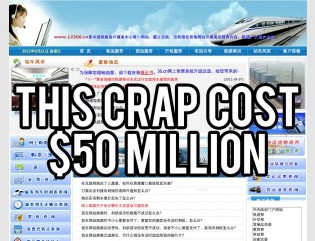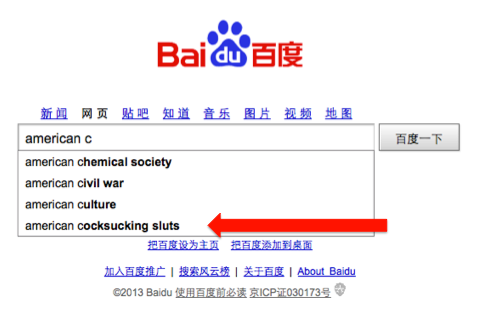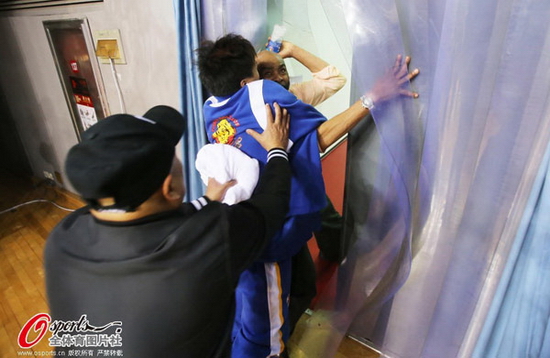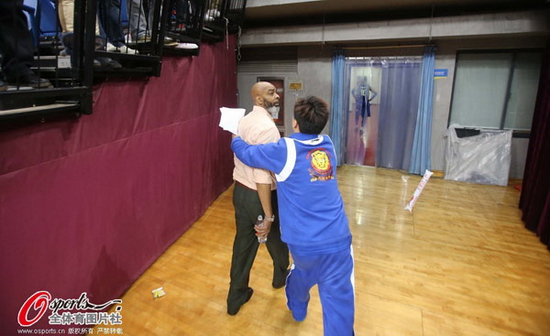Blogs » Society » GitHub Blocked In China Thanks To The Railway Ministry’s Crappy Ticketing Site
Blogs » Society » GitHub Blocked In China Thanks To The Railway Ministry’s Crappy Ticketing Site |
- GitHub Blocked In China Thanks To The Railway Ministry’s Crappy Ticketing Site
- Another Zoo Incident In China: Man Bites Ostrich To Death
- naked Sens8tion
- Outback: Aussie-style Bites in Shanghai
- The dance of sounds – solitude and aesthetic pleasure
- Now It’s Gilbert Arenas’s Turn To Hit A Game-Winning Shot
- Baidu Autofill Reinforces Stereotype That Americans Love Sluts
- China’s Economy: Anecdotes Are Sometimes The Best Antidote.
- Beijing needs a green roof revolution
- Twit T-who? Miss Wu trademark denied in Taiwan
- Tianjin Coach Gary Gaspard Had To Be Physically Restrained After Sunday’s CBA Debacle
- Suspect in Weibo murder case arrested in Longhua
- Sweet or salty eggs debate reignites age old north south divide
- How Many Chengguan Does It Take To Beat Up One Shop Owner?
- Steve Aoki @ Club G Plus
- Popasuda @ Dada | Jan. 19
- Caterpillar discovers fraud in Chinese subsidiary, shares drop 1.5%
- Presented By:
- Three of Shanghai's Best Hot Chocolates
- Diaoyu dispute needs 'rules of the game', according to Japan
| GitHub Blocked In China Thanks To The Railway Ministry’s Crappy Ticketing Site Posted: 22 Jan 2013 08:44 PM PST The Golden Shield Project (aka Great Firewall of China) has decided GitHub no longer conforms with Chinese notions of harmony, as first noticed Monday by GreatFire.org and reported on The Next Web. The block comes on the heels of the Ministry of Railways's unsuccessful attempt to convince Chinese browser-makers to stop providing a plugin that helps users purchase train tickets off MOR's website. A bit of background before we go any further: GitHub acts as a platform for software developers to share, revise, and track changes to code. This means that people who make those cool apps and websites we use every day use GitHub as a means to communicate with other developers, share their work, and generally make their products (and, thus, our lives) better1. According GitHub's representative, China ranks fourth in traffic to the site, while Beijing is the sixth-ranked city. There's no regional breakdown, but the service does have 3 million registered users. Also, this isn't the first time that GitHub has been censored. Last year, users were unable to download a new version of Node.js2, as its version number shared the same date as the 1989 Tian'anmen protests. As I mentioned above, much of the speculation as to causes surrounds the recent showdown over browser plugins between the Ministry of Railways and software companies, most notably Kingsoft (金山) and Qihoo 360. This does seem to make the most sense, as one of the plugins makes reference to javascript code that is hosted on GitHub. Block GitHub, stop the plugin. The plugins themselves don't use any APIs, as MOR's ticketing site, 12306.cn, doesn't actually have any APIs that I know of. Instead, they work by automatically refreshing the page until the desired ticket/trip becomes available for purchase. Imagine the Flash hitting refresh hundreds, if not thousands, of times every second. As you can imagine, this would put increasing pressure on already overloaded (read: incapable) servers dealing with the largest annual migration in the world. As my good friend and former podcast co-host Charlie Custer points out on Tech in Asia (he's responsible for the image above), the problems with overloaded servers and the plugins that overload them could all be solved very easily: make the website better. When the site first debuted, it was plagued with server-side issues and confusing interface… after the ministry spent $52 million. To give them credit, they did make some upgrades last September… that cost an extra $53 million (330 million RMB). The moral of this story: if you can't solve a problem by throwing money at it, make sure that unauthorized third-parties are unable to make things better, either. ~ 1 This is, of course, a contentious philosophical issue. If you want to hear my thoughts, buy me a beer and you'll get an earful. 2 Software used to write Internet applications that can flexibly handle higher and lower numbers of users depending on traffic. It's usually used on web servers. John Artman has been China watching and covering tech since 2010. Follow him @KnowsNothing. |
| Another Zoo Incident In China: Man Bites Ostrich To Death Posted: 22 Jan 2013 06:35 PM PST Mental health issues are no laughing matter, and neither is biting a large flightless bird to death. What to call this then? At a zoo in Guangdong province on Saturday, a man bit and killed a live ostrich in front of elders and children, then laid on the dead bird and made gun motions with his finger at the police. The man, 27-year-old Li, was found with a suicide note in his pocket addressed to his mother and girlfriend. He slit his wrists but apparently not very deep, considering cops cuffed him and dragged him up by his arms. The Nanfang notes, "Whether this was a genuine attempted suicide or a cry for help, I think we can all agree: the man needs help." Yes. The bizarreries of the human race. Guy attacks an ostrich as part of elaborate suicide attempt, ultimately fails (The Nanfang via Shenzhen TV) |
| Posted: 22 Jan 2013 05:17 PM PST Date: Jan 22nd 2013 3:16p.m. Contributed by: cityweekend_sh Book from Jan 23-30 to get up to 50% off your stay at naked Stables |
| Outback: Aussie-style Bites in Shanghai Posted: 22 Jan 2013 04:48 PM PST |
| The dance of sounds – solitude and aesthetic pleasure Posted: 22 Jan 2013 05:16 PM PST 
China has experienced tremendous economic growth over the last thirty years, with massive impact on many people's everyday life and environment. How does this change affect individuals' perception of their surrounding, and their possibilities for intimate pleasure? This week's selection will give us insight into the way various city dwellers relate to their environment, and their sources of sensual pleasure and intimate satisfaction. Liu Shisan's 'The dance of sound' describes the aesthetic exhilaration she gets from her sense of hearing; Ran Lan's 'Aesthetics of slowness' draws on the memories of years spent in Guilin to develop a broader reflection on 'slow life'; Li Yinhe's 'Praise of solitude' identifies the state of the solitary individual as one of potential happiness and freedom. The dance of sounds In this essay, Liu Shisan describes how she temporarily lost hearing in her right ear, and the subsequent exhilaration she received at fully experiencing the sounds of city life. She constructs a modernist patchwork of urban scenes experienced as soundscapes: eating wonton in a road-side café, vibrations on a crowded bus, or the stories brought up by the passing of trucks at night outside her open window. Marco Polo translation: http://marcopoloproject.org/online/声音的舞蹈-the-dance-of-sound-english/ The Aesthetics of slowness The first part of this piece evokes the pleasures experienced by Lan Ran in scenic Guilin, where he could enjoy a peaceful, rhythmic existence after years in the fast-pace of a coastal city of Guangdong. The second part offers a broader reflection on the pace of life and the joy of living slowly. A poem by Tang dynasty poet Li Shanyin on a man listening to the rainfall at night, and thinking of his absent wife, inspires a reflection on the massive changes brought about by technology. In this age of mobile phones and high-speed train, can we still miss an absent beloved? But this speed and efficiency, argues Lan Ran, has also weakened our own sense of memory – more fleeting impressions pass over us, but nothing stays. He mentions movements around the world – mostly Europe – promoting slowness as a value: the slow food and slow pace movements, and the slow city of Orvieto in Italy. Slowness, he concludes, may be the wealth of Gods – and the magic mountain where ten thousand years are but an hour may be within our reach: by slowing down enough, we can regain a sense of plenitude, and the rich depth of memory that slowness brings with it. Marco Polo translation: The aesthetics of slowness In praise of solitude Solitude is our most natural state, say Li Yinhe, but we flee from it in the crowd. The crowd is like a skin around us, reducing our sensitivity to the world. But that sharp perception of the world brought by solitude can be beautiful and happy, for one with a strong enough heart; 'eating and sleeping alone can be happy'. More than that, says Li Yinhe, solitude is the only truly free state, where one does not have to sacrifice or lie for family, friendship or love. Li Yinhe defines individual freedom as the possibility to follow one's heart truly, and so she concludes: 'in the name of freedom, I praise solitude'. Li Yinhe pursues a similar line of thought in 'Friends and love' and 'philosophy and family life', also published on the Marco Polo Project. Marco Polo translation: In praise of solitude All articles in this digest and a large range of other Chinese readings are accessible at Marcopoloproject.org. Some are available in English, French and Spanish translation. (You can join the project if you'd like to help with translations.) Danwei is an affiliate of the Australian Centre on China in the World at The Australian National University. This posting is a result of one project that is part of that on-going collaboration. The China Story, China Heritage Quarterly and East Asian History are publications of the Australian Centre on China in the World. |
| Now It’s Gilbert Arenas’s Turn To Hit A Game-Winning Shot Posted: 22 Jan 2013 11:30 AM PST Less than a week after Tracy McGrady drilled a game-winner on the road against Liaoning, this season's other big import from the NBA, Gilbert Arenas, showed everyone he has some clutch bones in him as well. With the clock winding down and the Shanghai Sharks down 94-93 in Nanjing, on the home court of the Jiangsu Dragons, Arenas made his move, which you can watch in the video above. As described by Shark Fin Hoops:
Arenas scored 25 points and grabbed 18 rebounds. Game highlights: Interview: Jiangsu Dragons 94 – Shanghai Sharks 95: Arenas' Snatches Victory For Sharks (Shark Fin Hoops) |
| Baidu Autofill Reinforces Stereotype That Americans Love Sluts Posted: 22 Jan 2013 09:34 AM PST Surely you're aware of the Google autofill / autocomplete meme? For instance, someone types the words "i accidentally" into a Google search bar as part of a longer phrase, but Google presumes you're too lazy to finish your five-word sentence, so it helpfully offers a pulldown list of possible searches such as "i accidentally the whole bottle" and "i accidentally slept with my mom," etc. It turns out Baidu has this feature as well. And if you tried to type "American consulate," this is what happens: That's all very normal and not newsworthy. Whoa, that escalated fast. If you honed your search a bit by adding one more letter, Baidu quickly pinpoints the exact thought in your head, in essence unzipping your pants for you: I went ahead and pressed enter after letting autofill complete my search query. American Cocksucking Sluts is apparently an adult film released in 2011 starring Brooklyn Lee, Juelz Ventura, and Gracie Glam. It received a 7.4/10 rating on IMDB, out of eight votes. The other links on the first page were disappointing. Let's just say there was nothing with which we could add to our list. Damn you, Baidu! Your search filter wins again. (H/T @uuao) |
| China’s Economy: Anecdotes Are Sometimes The Best Antidote. Posted: 22 Jan 2013 08:53 AM PST One of the things I love to ask people wherever I go (and yes, cabdrivers especially) is how's business? How's the economy. I am constantly asking my clients that as well and most of them (no matter what the country, about which I am asking) are saying "it's okay." Not great, but not all that bad either. That includes China. One thing that makes these conversations about China more relevant is that China's economic statistics tend not to be particularly reliable. Some blame Beijing for this. Others blame the local governments, whose salaries/bonuses/outlays are oftentimes based on how they are doing for their local economies. So shadow figures are often used to track China's economy, with one of the favorites being electricity consumption. The thinking is that if China is doing well, electricity consumption will be increasing. I am less of a fan of this measure than many for the following reasons:
Thought of all this just now after receiving an email from a Shanghai friend that said the following:
The email had a link to a blog post, entitled, "Chinese Electricity Conclusions Reexamined," the thrust of which is that China's electricity consumption is way up not because the economy is recovering, but because China is suffering from record cold weather. Makes sense to me. So I have to ask, how's business in China for you? How's the economy doing? Please be as specific as possible. |
| Beijing needs a green roof revolution Posted: 22 Jan 2013 02:19 AM PST Beijing has 90 million square metres of potential green roof space, which could provide food, reduce air pollution and cool the city during hot summers. Beijing's population has grown rapidly over the last 20 years and with construction under way on hundreds of kilometres of subway, a second huge airport and a high speed rail network, it is likely to continue to do so. Greening all the suitable roofs would require an estimated capital investment of 29 billion yuan (US$4.7 billion) at the current price, plus the yearly maintenance costs. This could drop with economies of scale and technological advances but still represents a considerable investment. |
| Twit T-who? Miss Wu trademark denied in Taiwan Posted: 22 Jan 2013 03:00 AM PST  The headlines on all of Taiwan's newsstands today are for Taiwanese Canadian designer Jason Wu whose request to register the trademark Miss Wu was turned down by a Taiwanese court on Monday. Miss Wu is not his namesake brand that shot to fame in 2009 thanks to America's first lady, but his new line for Nordstrom that debuted on Monday. [ more › ] The headlines on all of Taiwan's newsstands today are for Taiwanese Canadian designer Jason Wu whose request to register the trademark Miss Wu was turned down by a Taiwanese court on Monday. Miss Wu is not his namesake brand that shot to fame in 2009 thanks to America's first lady, but his new line for Nordstrom that debuted on Monday. [ more › ]     |
| Tianjin Coach Gary Gaspard Had To Be Physically Restrained After Sunday’s CBA Debacle Posted: 22 Jan 2013 03:15 AM PST What words do we have left for Sunday's colossal wreck of a basketball scrum between Qingdao and Tianjin, in which the two teams were whistled for a combined 89 fouls (an average of one and a half fouls per minute), shot 119 combined free throws, and each had three players foul out? I wrote that it was "how bad basketball can look when entrusted to the wrong people." NiuBBall's Jon Pastuszek called it an "abomination," "nightmare" and "pathetic." Andrew Crawford of Shark Fin Hoops tweeted, "In Chinese basketball, the biggest problem remains the standard of refereeing." It was a sad day indeed for fans of the CBA. But none of us were as mad as Gary Gaspard, Tianjin's "assistant" coach who often acts as the de facto head coach on the sidelines. (He was the one most adamant about pulling his players off the court to protest a call late in the fourth quarter.) If you believe the adage that a picture is worth a thousand words, glance upon this picture of Gaspard in the moments just after the game, which Qingdao won 140-138 in double overtime: That is a death stare. And it's coming from a man that by all accounts is a wise and sensible person. In an earlier interview with Tianjin Plus, he revealed that he has seven children and two grandchildren, and is "really blessed." He also teaches the Princeton offense, which is pretty great:
But… death stare: We're not sure who the player is ushering him off, but he deserves more playing time. O Sports has several more pictures of the coach here. We feel your pain, Mr. Gaspard. Again, here are the more embarrassing refereeing moments from Sunday's scrap. Skip ahead to the 9:13 mark to see the worst call of the game, a phantom foul that sent Qingdao's Chris Daniels to the line for two game-clinching free throws with 4.5 seconds remaining. |
| Suspect in Weibo murder case arrested in Longhua Posted: 22 Jan 2013 02:00 AM PST  Police have arrested the murderer of Lai Zengyuting, the 16 year old high school student who may have revealed her whereabouts by posting personal information on Weibo. [ more › ] Police have arrested the murderer of Lai Zengyuting, the 16 year old high school student who may have revealed her whereabouts by posting personal information on Weibo. [ more › ]     |
| Sweet or salty eggs debate reignites age old north south divide Posted: 22 Jan 2013 02:00 AM PST  It is a truth universally acknowledged that southern China has a sweet tooth and the north takes life with a pinch of salt, but the age old dichotomy between north and south has been emphasised once again in a fierce Weibo debate over some poached eggs. [ more › ] It is a truth universally acknowledged that southern China has a sweet tooth and the north takes life with a pinch of salt, but the age old dichotomy between north and south has been emphasised once again in a fierce Weibo debate over some poached eggs. [ more › ]     |
| How Many Chengguan Does It Take To Beat Up One Shop Owner? Posted: 22 Jan 2013 02:15 AM PST Earlier this month in Hainan province, this group beating. What happened? "Chengguan beating people, I tell ya," cries Ms. Gao, a shop owner. "A gang of chengguan came and beat us." Not knowing any other things about this… eh, we believe it. Chengguan — i.e. urban management officers — eventually left the scene, around the time the civilians called the real cops. The man who was gang-beaten was sent to the hospital. |
| Posted: 22 Jan 2013 01:00 AM PST |
| Posted: 22 Jan 2013 12:50 AM PST |
| Caterpillar discovers fraud in Chinese subsidiary, shares drop 1.5% Posted: 22 Jan 2013 01:00 AM PST     |
| Posted: 22 Jan 2013 01:00 AM PST |
| Three of Shanghai's Best Hot Chocolates Posted: 22 Jan 2013 12:00 AM PST |
| Diaoyu dispute needs 'rules of the game', according to Japan Posted: 22 Jan 2013 12:00 AM PST  An adviser to Japanese Prime Minister Shinzo Abe has said that Japan and China need "rules of the game" concerning the Diaoyu Islands, possibly confusing the potential trigger of WW3 with a Command & Conquer marathon he played over the weekend. [ more › ] An adviser to Japanese Prime Minister Shinzo Abe has said that Japan and China need "rules of the game" concerning the Diaoyu Islands, possibly confusing the potential trigger of WW3 with a Command & Conquer marathon he played over the weekend. [ more › ]     |
| You are subscribed to email updates from Update » Blogs » Society To stop receiving these emails, you may unsubscribe now. | Email delivery powered by Google |
| Google Inc., 20 West Kinzie, Chicago IL USA 60610 | |













Comments